- Bishop State Community College is a state-supported, open-admission, urban community college located in Mobile, Alabama. The College consists of four city campuses, dedicated to serving the residents of Mobile and Washington counties in southwest Alabama. The College is part of the Alabama College System, the state-supported network of two-year community and technical colleges that serves the residents of Alabama.
School Highlights
Bishop State Community College serves 4,222 students (33% of students are full-time).
The college's student:teacher ratio of 20:1 is same as the state community college average of 20:1.
Minority enrollment is 70% of the student body (majority Black), which is more than the state average of 43%.
Quick Stats (2025)
- Enrollment: 4,222 students
- In-state tuition: $4,260
- Out-state tuition: $7,650
- Acceptance Rate: 100%
- Student:teacher ratio: 20:1
- Minority enrollment: 70%
- Source: Verified school update
School Overview
The teacher population of 211 teachers has stayed relatively flat over five years.
Bishop State Community College
(AL) Community College Avg.
Carnegie Classification
Associate's Colleges: High Career & Technical-Mixed Traditional/Nontraditional
Associate's Colleges: Mixed Transfer/Career & Technical-High Traditional
Institution Level
At least 2 but less than 4 years
At least 2 but less than 4 years
Institution Control
Public
Public
Total Faculty
211 staff
153 staff
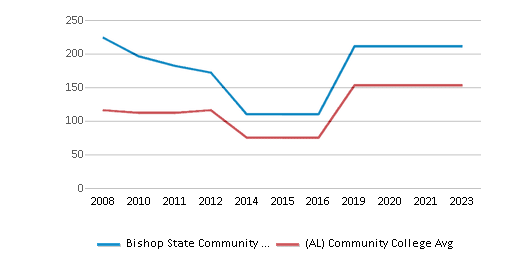
School Calendar
Student Body
The student population of Bishop State Community College has grown by 48% over five years.
The student:teacher ratio of 20:1 has increased from 10:1 over five years.
The Bishop State Community College diversity score of 0.56 is less than the state average of 0.60. The school's diversity has grown by 9% over five years.
Total Enrollment
4,222 students
2,464 students
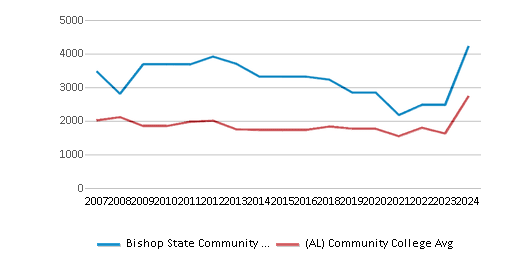
Student : Teacher Ratio
20:1
20:1
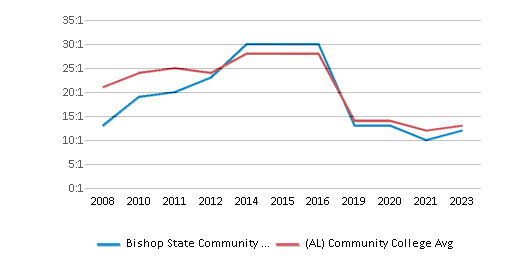
# Full-Time Students
1,393 students
873 students
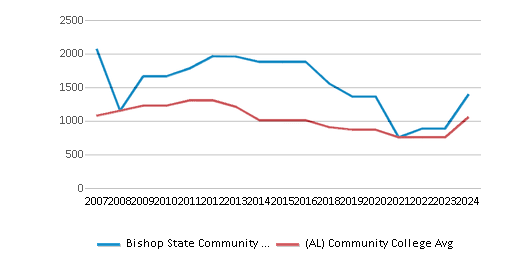
# Part-Time Students
2,829 students
1,855 students
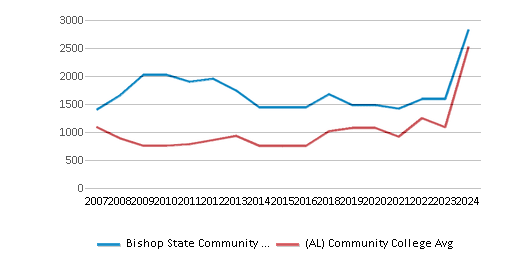
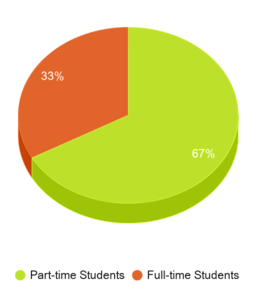
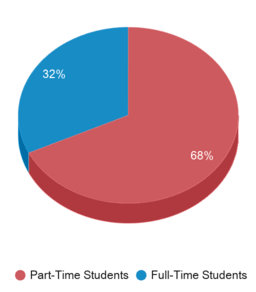
# Enrollment Undergraduate
422 students
422 students
# Full-Time Undergraduate Students
1,393 students
873 students
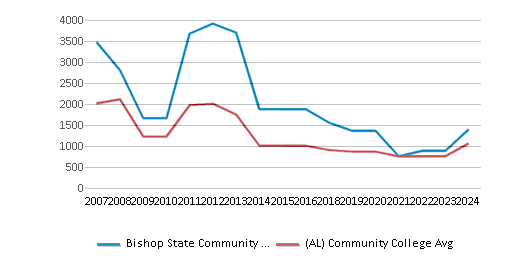
# Full-Time Graduate Students
n/a
11 students
# Part-Time Undergraduate Students
2,829 students
2,077 students
# Part-Time Graduate Students
n/a
30 students
Total Dormitory Capacity
n/a
168 students
% American Indian/Alaskan
1%
n/a
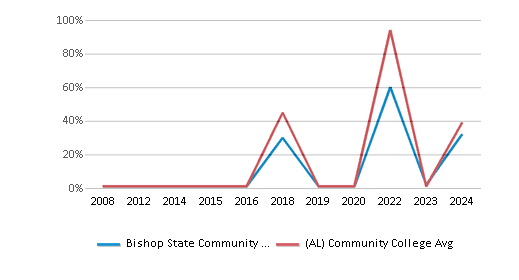
% Asian
2%
2%
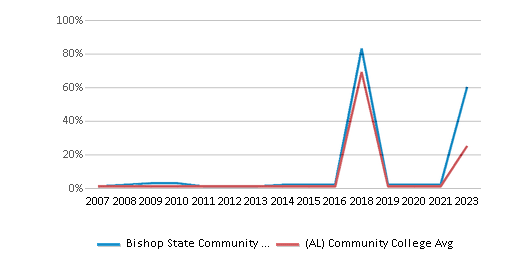
% Hispanic
3%
6%
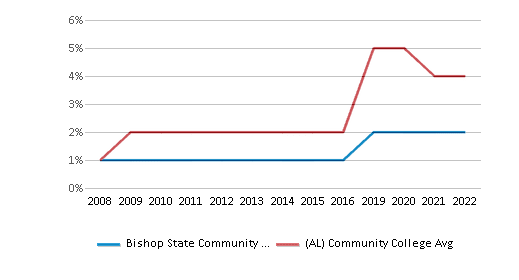
% Black
59%
27%
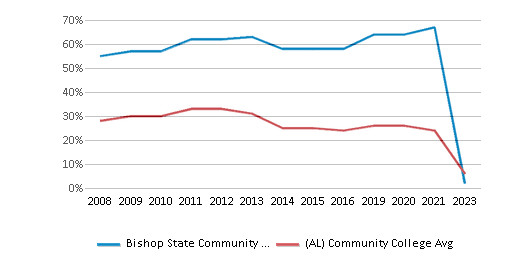
% White
30%
57%
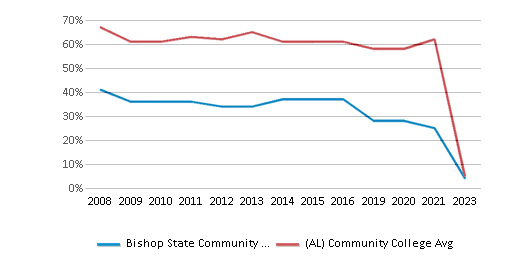
% Hawaiian
n/a
n/a
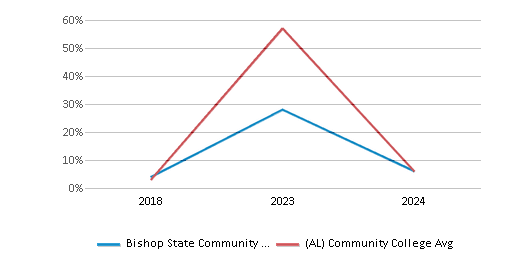
% Two or more races
4%
4%
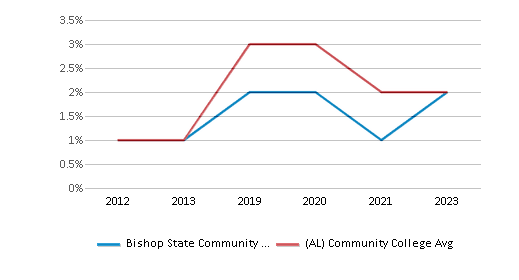
% Non Resident races
1%
1%
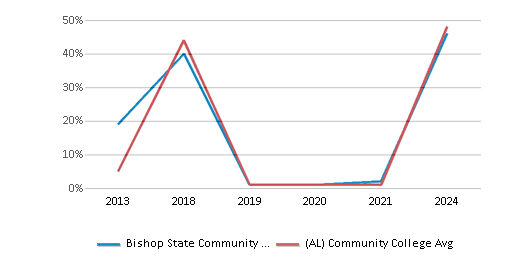
% Unknown races
1%
3%
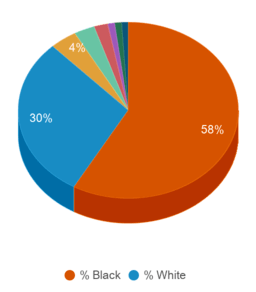
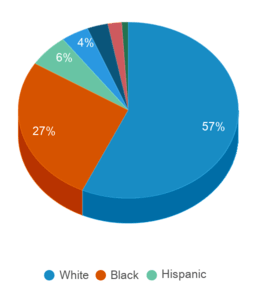
Diversity Score
0.56
0.60
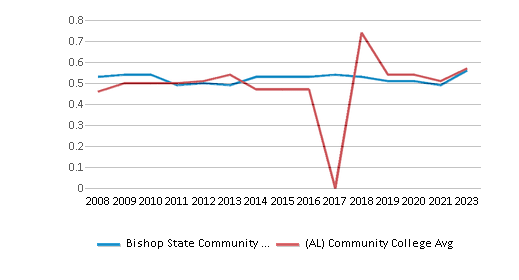
College Completion Rate (Students who graduate in less than 4 years)
0.2211%
0.2683%
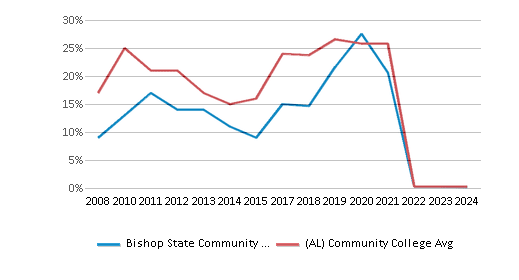
College Completion Rate (Students who graduate in 4 years or more than 4 years)
n/a
0.3%
Average Graduate Earnings (10 Years)
$26,500
$29,700
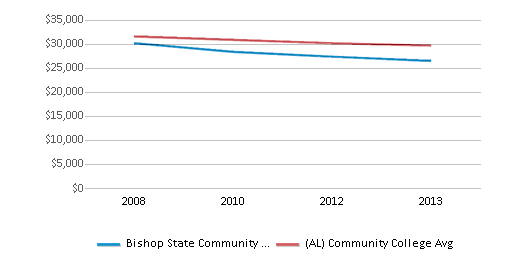
Tuition and Acceptance Rate
The public in-state tuition of $4,260 is more than the state average of $4,077. The in-state tuition has declined by 12% over four years.
The public out-state tuition of $7,650 is more than the state average of $7,206. The out-state tuition has declined by 13% over four years.
In-State Tuition Fees
$4,260
$4,077
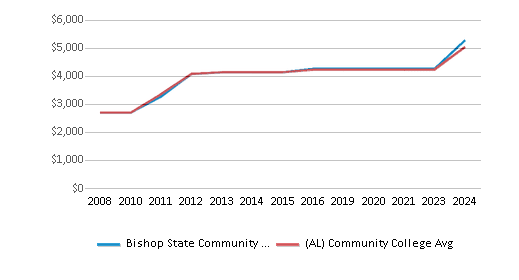
Out-State Tuition Fees
$7,650
$7,206
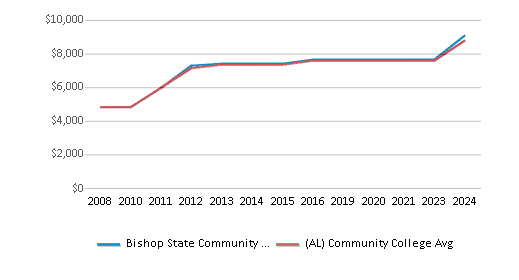
% Students Receiving Some Financial Aid
90%
90%
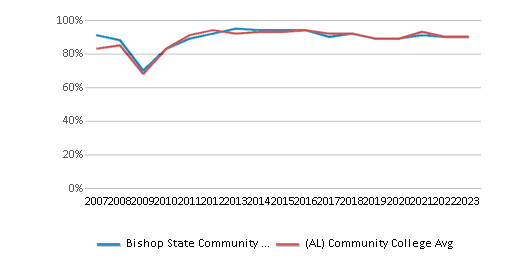
Median Debt for Graduates
n/a
$10,500
Median Debt for Dropouts
n/a
$5,500
Acceptance Rate
100%
81%
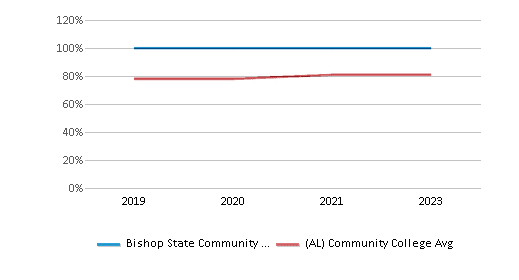
SAT Reading
n/a
530
SAT Math
n/a
545
ACT Composite
n/a
23
ACT English
n/a
21
ACT Math
n/a
22
Sports
Total Sports Offered
4 sports
Sports
Baseball, Basketball, Golf, Softball
Source: 2024 (or latest year available) Integrated Postsecondary Education Data System (IPEDS) , School Administrators
School Notes
- The four campuses make Bishop State the most convenient college option in Mobile. All four campuses -- Main, Baker-Gaines Central, Carver and Southwest -- are located within the city limits. There are seven off-campus sites located in Mobile and Washington counties -- Alma Bryant, Baker, Citronelle, McIntosh, Theodore and Semmes. Bishop State offers high quality educational and support services in each of the College's six academic divisions: Education, Humanities, Natural Science and Mathematics, Business and Economics, Social Sciences, and the Health-Related Professions. Bishop State offers academic and institutional scholarships, athletic scholarships, Federal Pell grants, work study programs and other forms of financial assistance. Bishop State is accredited by the Southern Association of Colleges and Schools (SACS) Commission on Colleges, the Alabama State Board of Education, the National League for Nursing, the Commission on Accreditation for Physical Therapy Education, the Commission on Accreditation of Allied Health Education, the American Culinary Federation Education Institute Accrediting Commission, and the Association of Collegiate Business Schools and Programs.
Frequently Asked Questions
How much does Bishop State Community College cost?
Bishop State Community College's tuition is approximately $4,260 for In-State students and $7,650 for Out-State students.
What is the acceptance rate of Bishop State Community College?
The acceptance rate of Bishop State Community College is 100%, which is higher than the state average of 81%.
What sports does Bishop State Community College offer?
Bishop State Community College offers 4 interscholastic sports: Baseball, Basketball, Golf and Softball.
In what neighborhood is Bishop State Community College located?
Bishop State Community College is located in the Owens neighborhood of Mobile, AL.
Recent Articles

Obtaining Your Bachelor's Degree at a Community College
Explore the evolving landscape of community colleges offering bachelor's degrees, addressing affordability, accessibility, and workforce needs.

A to Z of Community College Certificates and Courses
From business and healthcare to technology and skilled trades, the article showcases the breadth of options available to students seeking to enhance their knowledge, develop new skills, or pursue career advancement.

What is a Community College?
This comprehensive guide explains what a community college is, its history, and its role in higher education. It covers the types of programs offered, differences from four-year colleges, benefits of attending, and important considerations for prospective students, providing valuable insights for those exploring educational options.









